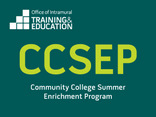2013 NIH COMMUNITY COLLEGE SUMMER ENRICHMENT PROGRAM
We are pleased to announce the 2013 NIH Community College Summer Enrichment Program (CCSEP). The purpose of this program is to increase the number of community college students who participate in the NIH Summer Internship Program (SIP). The long-term goal is to increase the number of community college students who transfer to four-year colleges and universities and consider careers in the biomedical sciences. In addition to performing full-time research in a laboratory or on a project at the NIH, CCSEP interns will meet each week as a group to participate in workshops and courses focused on the development of academic and professional skills in preparation for careers in health care and in social, behavioral, and biomedical research.
CCSEP interns are a part of the larger NIH Summer Internship Program or SIP, so all opportunities and responsibilities that apply to SIP interns also apply to CCSEP interns.
CCSEP applicants must meet all eligibility requirements for the NIH Summer Internship Program. They must be:
- U.S. citizens or permanent residents;
- Enrolled at least half-time in a U.S. accredited Community College**; and
- At least sixteen years of age when they begin the program.
In addition, they must have a minimum GPA of 3.0.
**Students enrolled in dual-programs with four-year institutions or high school accelerated programs are ineligible for CCSEP
To Apply
To apply, you must complete the standard SIP application and indicate in your cover letter that you are applying for CCSEP. Applications will open mid-November. The application deadline is January 28, 2013 at 5 pm EST. Letters of reference must be received by January 31, 2013 at 5 pm EST.
IMPORTANT: In item 9 on the Summer Internship Program application, Preferred Institute/Center (IC) or Program, please be certain to select CCSEP.
How will the program work?
Individuals who are selected for the CCSEP will be matched with NIH principal investigators (PIs) who have indicated their interest in hosting a community college student. Every effort will be made to match the research interests the applicant describes in the application with the principal investigator's ongoing projects.
The exact dates for the summer experience will be negotiated between each community college intern and his/her PI. However, all interns in the CCSEP program will be required to be on campus during the core program period: the first week of June to August 9, 2013. Summer internships are full-time positions; interns are expected to devote a minimum of 40 hours per week to their projects and training. In return, interns receive a stipend, determined by educational level. Funds for local transportation to and from the NIH will be provided as well.
During the summer, the NIH Office of Intramural Research & Training will offer workshops and seminars, focused specifically on community college students, that cover career and professional development topics. Examples of planned activities include an orientation to the NIH; writing and oral presentation skills workshops; career advising; and workshops on scientific skills such as basic science writing, keeping a lab notebook, and understanding scientific ethics. Attendance at these CCSEP group activities will be required. At the end of the summer, each participant in the CCSEP will be expected to present his/her work at Summer Poster Day.
Support for CCSEP is generously provided by the NIH Office of Research on Women's Health, the NIH Office of AIDS Research, and the Foundation for Advanced Education in the Sciences.
Quotes from CCSEP Participants
"This experience exceeded my expectations, because it not only give me hands-on research experience, but allowed me to network and take advantage of NIH resources that will help me with my future goals."
"It is a great program! Most of the seminars were extremely helpful to my research, and I was really glad that there were talks geared to help those with limited research experience (the lab notebook and ethics lectures were especially useful). The program exceeded my expectations, and made starting out in my lab far less intimidating."
"The program met my expectations because I got a lot from the training sessions and gained research experience. I now know what being a scientist entails."
"I learned a lot about science and the careers it offers"
CCSEP 2011: View the Slideshow
NEW! Applying Successfully Video
Hear what summer interns have to say about SIP
Advice to Applicants
Writing a Successful Application
Putting Your Best Foot Forward: Self Advocacy for Scientists
Apply
Am I eligible to apply to SIP?
View the Video of Community College Day 2010
Resources
Web site for Current SIP Interns
Summer Poster Day Program (2012)
NED, the NIH Enterprise Directory (contains contact information for NIH investigators)
Intramural Investigator Database
Rules and Regulations


